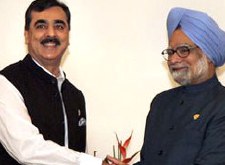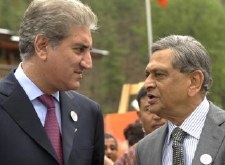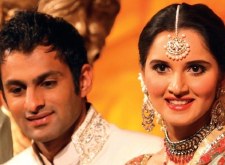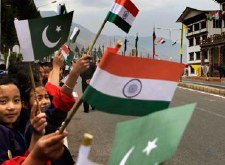Adil Najam
Much has been happening on the India-Pakistan scene. Much of it is good. But, given that this is India and Pakistan, ominous clouds of distrust are never very far away.
With the SAARC Summit gathering steam in Thimphu, Bhutan, there is much talk of a serious meeting and possibly some joint communique from Prime Ministers Yousuf Raza Gillani and Manmohan Singh. But with typical South Asian theatrics, doubts still linger on whether such a meeting will be held and whether something will come of it. A recently more confident Pakistani Foreign Minister is calling on India to move on from 26/11 to start forging better relations with Pakistan. And Indian opinion, jilted by the news of an Indian diplomat who was reportedly “spying” for Pakistan, is also in danger of being turned away from whatever good vibes have been created by the recent warming in the relations between the two neighbors and civil society initiatives such as Amn Ki Aasha, or glitterati gossip of the Shoaib Malik-Sania Mirza wedding, etc.
Much more importantly, perhaps, we have again been reminded by former Pakistani Foreign Minister Khursheed Mehmood Kasuri just how close the two countries were just a little while ago on a real and meaningful agreement on long-standing disputes, including on issues related to water management, to Kashmir, to economic cooperation, etc.
My colleague Moeed Yusuf and I recently published a research paper in the academic journal Third World Quarterly that looks at the history of the Kashmir issue between the Pakistan and India and undertook a detailed content analysis of every proposal made for its resolution in these 60+ years. In short, the analysis suggests that “the dispute may be more ‘ripe’ for resolution today than it has ever been in the past.”
As I have argued elsewhere, this does not mean that the dispute is ready to be resolved. It does mean that there is a opportunity today to improve these relations that must not be missed. But unless the leadership of the two countries really start talking, it will be missed. And that has been by central argument about India-Pakistan relations for many years now. As I said recently at a discussion organized by the Asia Society in New York (with me and Indian defense analyst Raja Mohan as the featured speakers), the simple fact is that “Not talking is never a good way to start talking.” Here is a video of my detailed argument and the ensuing discussion with Raja Mohan (my formal presentation starts around minute 14):
So, my plea for Thimphu and beyond Thimphu remains the same that it was before Thimphu. Please talk, Dear Prime Ministers. And please keep talking.























































The level of Indian resentment against Pakistan can be judged by the reaction of Indians to Sania intentions to marry Shoib. It was an ideal opportunity for the Indians to say that this is yet another indication that we are really all the same and we should become bhai bhai again.
Pakistan and India have been talking for too long for the sake of talks. They have been trying to manage the dispute rather than resolve them. Now, it is time for India to show some maturity and not keep weeping about 26/11. This does not mean this could be an opportunity to resolve all the disputes. This only means that disputes could be much better managed within the context of modern management and dispute contingency planning for the long range of humanity. Both sides should realize that old fashioned dispute management is not in vogue anymore. Moreover, it does not mean that we have to fight. We could resolve these disputes while building peace zones on both sides. India has become a democratic state with an undemocratic mindset. It needs to realize that peace with Pakistan will bring it enormous benefits. For one, it could lead to better security for its citizens in the big cities. And India should know it can never (emphasis NEVER) become an economic power without the help of Pakistan. All the so called dreams of economic super power status can be brought crashing down without genuine efforts to make peace. Moreover, India should stop looking down upon Pakistan with a condescending and patronizing attitude.
Both these countries need to revive peaceful relationship with each other, not only it is important for both these countries, but also for the peace of the whole region. An improved relationship will also help in rooting out the problem of terrorism from the region.
The main duty of the commission was to investigate, not to name those who were involved in the killing. It is the responsibility of the present government to accuse and bring the main culprits to justice.
India Pakistan talks often degenerate into an exercise in futility.
The positions of the two countries are far too divergent.They cannot even agree on what to talk about.